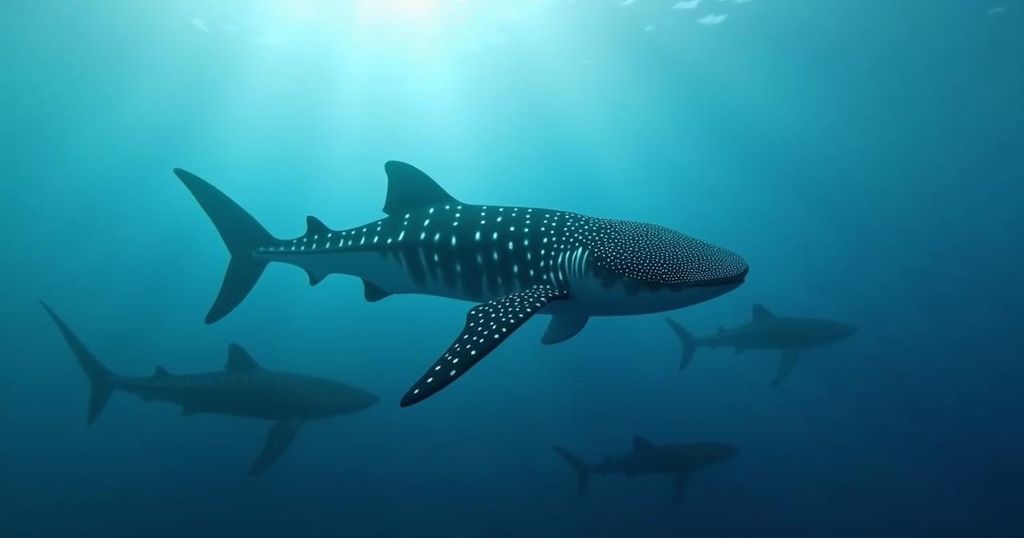Research indicates that global warming significantly elevates the risk of whale sharks encountering dangerous shipping zones. As their habitats shift due to rising ocean temperatures, projections suggest a dramatic increase in the likelihood of collisions with large vessels. The findings underscore the critical need for integrating climate change considerations into conservation efforts for this endangered species, particularly in light of projections that indicate a possible loss of over 50% of their core habitats under current emissions scenarios by the end of the century.
Recent research has revealed that climate change poses an elevated risk to endangered whale sharks due to potentially dangerous encounters with shipping vessels. As the largest fish species, able to reach lengths exceeding 60 feet, whale sharks face increased threats from large ships as ocean temperatures rise. Scientists from the University of Southampton and the Marine Biological Association (MBA) project that the warming of oceans will compel these endangered sharks to migrate to new habitats that coincide with busy shipping lanes. Consequently, the study, featured in the journal Nature Climate Change, forecasts a staggering 15,000-fold increase in the likelihood of whale sharks encountering large ships by the century’s end. Lead researcher Dr. Freya Womersley highlights that the shifts in the habitats of whale sharks are most pronounced under severe emission scenarios, warning that a global habitat reconfiguration could result in significant losses in some regions while simultaneously increasing the likelihood of ship strikes. Despite whale sharks being highly adept at adapting to changes in temperature, recent studies indicate their vulnerability to large vessels, which often lead to fatal collisions. The researchers utilized satellite tracking data of whale sharks along with global climate models to investigate the species’ distribution across three potential future climate scenarios. These models predict a loss of over 50% of core habitats in certain national waters, particularly in Asia, under current emission trajectories. Conversely, a sustainable development scenario aimed at limiting global warming to no more than 2°C could result in the recovery of some core habitats, particularly in European waters. Co-author Professor David Sims emphasized the importance of mitigating climate change, stating that such efforts could potentially ease the drastic shifts predicted in whale shark habitats. The researchers also analyzed the interaction between shifts in whale shark distribution and shipping traffic density, finding that several newly suitable habitats overlap with busy shipping routes, notably within the North Pacific Ocean, the Eastern China Seas, and the North Atlantic Ocean. However, areas such as the Gulf of Mexico displayed a reduction in the risk of encounters due to a shift of core habitats closer to coastal waters, further away from busy shipping lanes. Nevertheless, the overall trend indicates an increased risk of ship encounters under all climate scenarios, despite the shipping industry being projected to expand significantly by mid-century. This study underscores the necessity of incorporating climate change considerations into marine species management strategies, as noted by Dr. Womersley, who stated the importance of understanding how climate change interacts with anthropogenic pressures on vulnerable marine species.
Climate change represents a growing threat to biodiversity, particularly for species such as the whale shark, which is currently classified as endangered. As ocean temperatures continue to rise due to global warming, shifts in marine habitats are expected, leading to increased risks for large marine life such as whale sharks. The impact of climate change not only alters the availability of suitable habitats but also increases the likelihood of harmful interactions with human activities, particularly shipping, which could lead to increased fatality rates among endangered species. This research highlights the urgent need to understand the complex interplay between climate change and human impacts on marine environments, with the goal of implementing effective management strategies to protect vulnerable species from imminent dangers that stem from both habitat loss and increased shipping traffic.
To sum up, the study conducted by the University of Southampton and the Marine Biological Association highlights a critical intersection between climate change and species conservation. Increased ocean temperatures are forecasted to push endangered whale sharks into dangerous shipping lanes, resulting in significantly higher risks of ship strikes. While the potential for recovery exists under sustainable development scenarios, the study calls for immediate action to mitigate emissions and integrate climate change considerations into marine management practices to protect these vulnerable giants from the dual threats of habitat loss and shipping collisions.
Original Source: www.thetimes-tribune.com






